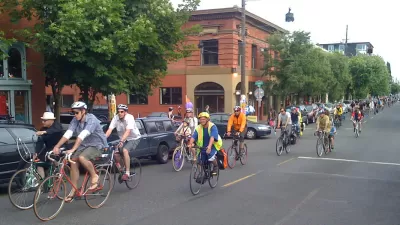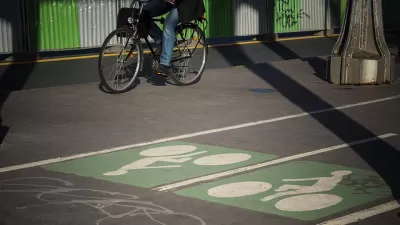A recent study from researchers at the University of Bologna adds to a growing body of evidence regarding their effects of laws that require bicyclists to wear high-visibility clothing.

A study by Gabriele Prati of the University of Bologna examined legislation mandating high-visibility clothing for bicyclists and found that such laws did not influence the number of cyclists in crashes, nor do such laws influence the total number of vehicles involved in road crashes.
Henry Robertshaw shares the new of the new study, published in the March 2018 issue of the Journal of Transport & Health. "This is the latest in a number of studies to cast doubt on the idea that making cyclists wear hi-vis clothing has an impact on making cyclists safer, even if there is more evidence that wearing hi-vis or reflective clothing makes cyclists more visible to drivers," writes Robertshaw.
FULL STORY: Making hi-vis clothing compulsory for cyclists does not reduce number of crashes, study finds

Planetizen Federal Action Tracker
A weekly monitor of how Trump’s orders and actions are impacting planners and planning in America.

Congressman Proposes Bill to Rename DC Metro “Trump Train”
The Make Autorail Great Again Act would withhold federal funding to the system until the Washington Metropolitan Area Transit Authority (WMATA), rebrands as the Washington Metropolitan Authority for Greater Access (WMAGA).

DARTSpace Platform Streamlines Dallas TOD Application Process
The Dallas transit agency hopes a shorter permitting timeline will boost transit-oriented development around rail stations.

Renters Now Outnumber Homeowners in Over 200 US Suburbs
High housing costs in city centers and the new-found flexibility offered by remote work are pushing more renters to suburban areas.

The Tiny, Adorable $7,000 Car Turning Japan Onto EVs
The single seat Mibot charges from a regular plug as quickly as an iPad, and is about half the price of an average EV.

Supreme Court Ruling in Pipeline Case Guts Federal Environmental Law
The decision limits the scope of a federal law that mandates extensive environmental impact reviews of energy, infrastructure, and transportation projects.
Urban Design for Planners 1: Software Tools
This six-course series explores essential urban design concepts using open source software and equips planners with the tools they need to participate fully in the urban design process.
Planning for Universal Design
Learn the tools for implementing Universal Design in planning regulations.
Roanoke Valley-Alleghany Regional Commission
City of Mt Shasta
City of Camden Redevelopment Agency
City of Astoria
Transportation Research & Education Center (TREC) at Portland State University
US High Speed Rail Association
City of Camden Redevelopment Agency
Municipality of Princeton (NJ)





























